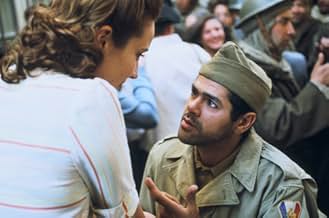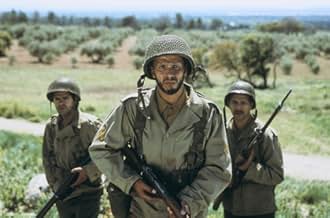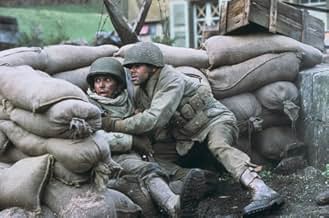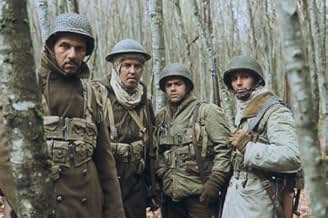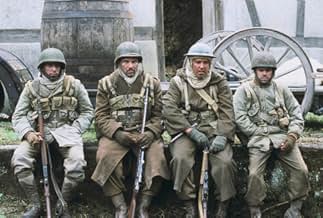IMDb-BEWERTUNG
7,0/10
15.445
IHRE BEWERTUNG
Füge eine Handlung in deiner Sprache hinzuDuring World War II, four North African men enlist in the French army to liberate that country from German oppression, and to fight French discrimination.During World War II, four North African men enlist in the French army to liberate that country from German oppression, and to fight French discrimination.During World War II, four North African men enlist in the French army to liberate that country from German oppression, and to fight French discrimination.
- Regie
- Drehbuch
- Hauptbesetzung
- Für 1 Oscar nominiert
- 9 Gewinne & 17 Nominierungen insgesamt
Empfohlene Bewertungen
So you've done a great piece of work, and are awaiting your just rewards. Somehow along the way, someone else, by colour, creed, or connections, get all the recognition that you're due credit for. You feel frustrated, but you think of your rice bowl, and decide to grit your teeth and bear it, calling it just another day, secretly longing for a time where you are empowered to do something about it.
In the liberation of France during WWII, North African men were recruited and enlisted in the French army in the fight against the Nazis. Why do they do it? One reason is to escape poverty, and the holding on to the glimmer of hope that they can be accepted, when the war is over, as equals based on their fight for the "motherland". These soldiers, mujahedeens, fought hard, often being in the frontline, but always overlooked when it comes to recognition of basic military welfare and promotions, not that these rewards will cost an arm or a leg, nor are the fighters so hard up for them. All they're asking for was fair treatment, but all they got was discrimination.
Yes, and that is the pain. WWII movies are aplenty, but Days of Glory offered a unique look at the battles by a group of men, for what they deem their motherland and will defend with their blood, and what more, for a land of people who do not see them as equals. Loving someone who does not love you back, sounds familiar? And it's not just love, but sworn allegiance to protect at all costs.
The movie is well paced and straddled moments of action and quiet contemplation with aplomb. Credit must go to the ensemble cast of actors who play the warriors of North Africa, as they battle both the enemies on French soil, as well as enemies of men's heart. They grapple with trying to remain rational in their reason(s) to do what they're doing.
At times, watching this movie made me think about the recent flurry of mails to the press about foreign talent and the issue of citizenship, about NS obligations and whether PRs will flee at the first signs of trouble, or stand shoulder to shoulder with citizens (also, who are those who will flee?) in defending our land. What are the issues of contention, discrimination against, or general presumptions about foreigners here?
Those expecting all out battle scenes might be disappointed. In truth the movie's never about the glorification of gore, violence and war - most scenes aren't really blood splattering to draw in the crowds. Instead, if you'd prefer moments where you can think out loud about the issues presented, then this is for you. However, the final battle would please action fans, as it is well choreographed and executed, and you feel both the pain and victory from a bunch of tightly knit soldiers trying their very best to defend a small town, in a samurai- seven-ish sort of way, also reminiscent of Saving Private Ryan's somehow.
If you've missed this during the French Film Festival, don't fret. I believe this movie is also slated for general release. Keep a look out for it!
In the liberation of France during WWII, North African men were recruited and enlisted in the French army in the fight against the Nazis. Why do they do it? One reason is to escape poverty, and the holding on to the glimmer of hope that they can be accepted, when the war is over, as equals based on their fight for the "motherland". These soldiers, mujahedeens, fought hard, often being in the frontline, but always overlooked when it comes to recognition of basic military welfare and promotions, not that these rewards will cost an arm or a leg, nor are the fighters so hard up for them. All they're asking for was fair treatment, but all they got was discrimination.
Yes, and that is the pain. WWII movies are aplenty, but Days of Glory offered a unique look at the battles by a group of men, for what they deem their motherland and will defend with their blood, and what more, for a land of people who do not see them as equals. Loving someone who does not love you back, sounds familiar? And it's not just love, but sworn allegiance to protect at all costs.
The movie is well paced and straddled moments of action and quiet contemplation with aplomb. Credit must go to the ensemble cast of actors who play the warriors of North Africa, as they battle both the enemies on French soil, as well as enemies of men's heart. They grapple with trying to remain rational in their reason(s) to do what they're doing.
At times, watching this movie made me think about the recent flurry of mails to the press about foreign talent and the issue of citizenship, about NS obligations and whether PRs will flee at the first signs of trouble, or stand shoulder to shoulder with citizens (also, who are those who will flee?) in defending our land. What are the issues of contention, discrimination against, or general presumptions about foreigners here?
Those expecting all out battle scenes might be disappointed. In truth the movie's never about the glorification of gore, violence and war - most scenes aren't really blood splattering to draw in the crowds. Instead, if you'd prefer moments where you can think out loud about the issues presented, then this is for you. However, the final battle would please action fans, as it is well choreographed and executed, and you feel both the pain and victory from a bunch of tightly knit soldiers trying their very best to defend a small town, in a samurai- seven-ish sort of way, also reminiscent of Saving Private Ryan's somehow.
If you've missed this during the French Film Festival, don't fret. I believe this movie is also slated for general release. Keep a look out for it!
It's 1943 Algeria. Muslims are recruited to fight for France. They go to Morocco to train and then arrive in Italy in 1944 to fight with the Allies. Saïd Otmari is poor illiterate mountain goat herder. Messaoud Souni is well spoken and falls for a French woman. Sergeant Martinez is a hardened leader willing to send the green recruits into suicidal charges but he hides his personal Arab connections. The men face racism in many blatant ways and Abdelkader gives voice to getting more equality.
This is an interesting part of the war that has been white-washed. The movie does struggle with a simple message as the men themselves have infighting about the war and their cause. Some of them fight for the money while others bought into the slogans. There is some good action and a solid final battle.
This is an interesting part of the war that has been white-washed. The movie does struggle with a simple message as the men themselves have infighting about the war and their cause. Some of them fight for the money while others bought into the slogans. There is some good action and a solid final battle.
Days of Glory (Indigénes) can boast that it was the most important if not the most successful of the five films in the Oscars' Best Foreign Film category. After French Premier Jacques Chirac saw the film, he agreed to compensate all North Africans who fought in World War II by unfreezing their pensions, a result the director Rachid Bouchareb worked hard to achieve. Though conventional in its technique and lacking in any real character development, Days of Glory, a French Moroccan Algerian co-production, is an involving and heartfelt film whose outstanding ensemble cast won the award for Best Actor at the 2006 Cannes Film Festival.
The film depicts a group of North African volunteers who enlist in the French army to support the French resistance against the Nazis during World War II. The fact that they are fighting for a lesser group of colonial oppressors against a more virile one does not enter their mind and they are ecstatic with the thrill of being on French soil for the first time. Their shabby treatment, however, by bigots in the French army who deny them the privileges that they take for granted becomes the centerpiece of the film. Unlike the French, the North African recruits are not granted leave to visit their families, are not promoted, and are not even allowed tomatoes with their dinner.
The film opens in 1943 as the enlisted men say goodbye to their families in Algeria, Morocco, and Senegal to join the fight against the Germans. Bouchareb follows four men: Said (James Debbouze), a young Algerian is moved to enlist by a recruiter's sloganeering and his own desire to escape his economic hardship; Yassir (Samy Naceri) who joins in Morocco even though he cannot help being bitter toward the French government that killed his family in the name of pacification.
We later meet Messaoud (Roschdy Zem), a solid marksman who falls for a young French woman but their correspondence is intercepted and censored by the French and his "no luck" tattoo on his neck turns out to be prophetic. The strongest character in the film is Abdelkader (Sami Bouajila), whose outspokenness against the injustice shown to North African soldiers keeps him from being promoted but earns him a strong following. Said develops a close relationship with Sergeant Martinez (Bernard Blancan), a by the book Captain who nonetheless speaks up for the dedication of his men but when Said happens to suggest that Martinez is part Arab, their relationship ends swiftly and dramatically.
The high point of the film is the battle for a village in Alsace. It is a tense, emotionally harrowing sequence that is the equal of anything in Saving Private Ryan. Days of Glory has a strong point of view but is not didactic. It simply lets us see the face of discrimination against Arab soldiers during the war and the tension that arose in the French army because of it, a harbinger of colonial wars and urban tensions to follow. While the film unfortunately ends on a clichéd note, it is still quite moving and makes sure the brave soldiers from North Africa are acknowledged for their contribution, sadly overlooked these many years.
The film depicts a group of North African volunteers who enlist in the French army to support the French resistance against the Nazis during World War II. The fact that they are fighting for a lesser group of colonial oppressors against a more virile one does not enter their mind and they are ecstatic with the thrill of being on French soil for the first time. Their shabby treatment, however, by bigots in the French army who deny them the privileges that they take for granted becomes the centerpiece of the film. Unlike the French, the North African recruits are not granted leave to visit their families, are not promoted, and are not even allowed tomatoes with their dinner.
The film opens in 1943 as the enlisted men say goodbye to their families in Algeria, Morocco, and Senegal to join the fight against the Germans. Bouchareb follows four men: Said (James Debbouze), a young Algerian is moved to enlist by a recruiter's sloganeering and his own desire to escape his economic hardship; Yassir (Samy Naceri) who joins in Morocco even though he cannot help being bitter toward the French government that killed his family in the name of pacification.
We later meet Messaoud (Roschdy Zem), a solid marksman who falls for a young French woman but their correspondence is intercepted and censored by the French and his "no luck" tattoo on his neck turns out to be prophetic. The strongest character in the film is Abdelkader (Sami Bouajila), whose outspokenness against the injustice shown to North African soldiers keeps him from being promoted but earns him a strong following. Said develops a close relationship with Sergeant Martinez (Bernard Blancan), a by the book Captain who nonetheless speaks up for the dedication of his men but when Said happens to suggest that Martinez is part Arab, their relationship ends swiftly and dramatically.
The high point of the film is the battle for a village in Alsace. It is a tense, emotionally harrowing sequence that is the equal of anything in Saving Private Ryan. Days of Glory has a strong point of view but is not didactic. It simply lets us see the face of discrimination against Arab soldiers during the war and the tension that arose in the French army because of it, a harbinger of colonial wars and urban tensions to follow. While the film unfortunately ends on a clichéd note, it is still quite moving and makes sure the brave soldiers from North Africa are acknowledged for their contribution, sadly overlooked these many years.
France 1943. Indigenous Moroccan soldiers still wet behind the ears are called in to the 17th infantry to defend their 'motherland' against the ongoing German occupation. Their goodness and patriotism are unmistakable and Saïd (Jamel Debbouze) remarks how "If I liberate a country, it's my country, even if I've never even been there." Here is a good-hearted contingent of North African soldiers who hope to catch some of the victory's glory, but whom are repeatedly shifted to the backseat because of their name, skin and accent.
There was no way I would miss a film that French president Chirac cites as the sole reason he immediately rectified the pension plan for indigenous veterans, offering them the promise of equality for the law for the first time. Indigènes is puffed full of political correctness with heavy-handed treatment of salient issues such as racism, inequality and intolerance. But we do not mind, because the film so rigorously establishes a brotherhood feeling with our triumvirate of central characters that we find ourselves completely engrossed in their struggle, rooting for them, laughing with them and often crying because of them.
In the front row for sympathy sits Saïd, Yassir, Messaoud and Abdelkader, all inhabited by capable unknown actors with great emotional transparency. Saïd is a kind of clumsy teddy bear who kisses his mom goodbye in Morocco and immediately botches his way through combat, even choking on the victorious scotch and fumbling with the token victor's cigar when the first battle has been won. These are heartbreakingly real people. Arguably even the hard-edged Sergeant elicits a warm response when he unflinchingly takes on the father-role for the contingent he is rough, harsh, cynical but fair. The male ensemble won the Cannes award for 'Best Actor' earlier this year, which solidifies their collective likability and serve as a mark of the film's warm cast centre. If you want to nitpick, it needs to be said that some moments (such as key death scenes), although tragic, inexplicably lack the propelling poignancy to elicit tears. Why this is I do not know, but it ought to be attributed to the film and not the superb performances.
When the squad of wet puppies make their way across the motherland, they are faced with two disturbances: the internal conflicts that arise in the army when it becomes apparent that North African soldiers are not given the same treatment as native French (no tomatoes, no weekend leaves, no promotions and no glory) and the gruesome reality on the battlefield. The former is captured safely but compellingly through little rants, intense stares and cries of "Liberté, Egalité, Fraternité!" all in the token French political spirit. The latter, however, is Indigènes' true goldmine. No description will do the warfare sequences justice; they need to be seen. Think Call of Duty plugged into the silver screen, with epileptic zooming, fast-paced action, gory reality, humming rocket launchers and one massive sense of immediate danger. It nearly puts Steven Spielberg's warmovie fare to shame.
The cinematography channels one storyline from 'Babel', from the epic aerial shots of the craggy hills and desert-laden plains of Morocco to a juxtaposition of lush French soil. Even the French sheets are a great source of awe for the North African soldiers. Much like 'Babel', the film never shies away from blending equal amounts of Arabic and French into the dialogue, something that reinforces the realism.
Indigènes (2006) is an excellent film with strong performances and a strong, political core. Its flaws, however apparent, are generally marginal. The one thing that jumped out and grabbed me, striking me as below average, was the hammy and inexcusably hackneyed score. When Arabic soldiers are fighting for their lives and bleeding in the process, slapping on a dutiful ethnic score that sings and wails like it means business, the film is just preaching to the choir. If I hear an "epic, ethnic" score in a movie like this again, I will probably go out and kill someone either the Arab who is singing, or the stupid Westerner who thinks mainstream audiences need everything spelled-out for them with this mandatory music inclusion.
Aside from this minor misstep, Indigènes is a worthy merit to France's resumé of films, one that will surely be a frontrunner for the Best Foreign Language Film Award at the Oscars next year. Nevermind that this is an excellent and real film, the competent political notions may just be enough to tip things over in its favour.
8 out of 10
There was no way I would miss a film that French president Chirac cites as the sole reason he immediately rectified the pension plan for indigenous veterans, offering them the promise of equality for the law for the first time. Indigènes is puffed full of political correctness with heavy-handed treatment of salient issues such as racism, inequality and intolerance. But we do not mind, because the film so rigorously establishes a brotherhood feeling with our triumvirate of central characters that we find ourselves completely engrossed in their struggle, rooting for them, laughing with them and often crying because of them.
In the front row for sympathy sits Saïd, Yassir, Messaoud and Abdelkader, all inhabited by capable unknown actors with great emotional transparency. Saïd is a kind of clumsy teddy bear who kisses his mom goodbye in Morocco and immediately botches his way through combat, even choking on the victorious scotch and fumbling with the token victor's cigar when the first battle has been won. These are heartbreakingly real people. Arguably even the hard-edged Sergeant elicits a warm response when he unflinchingly takes on the father-role for the contingent he is rough, harsh, cynical but fair. The male ensemble won the Cannes award for 'Best Actor' earlier this year, which solidifies their collective likability and serve as a mark of the film's warm cast centre. If you want to nitpick, it needs to be said that some moments (such as key death scenes), although tragic, inexplicably lack the propelling poignancy to elicit tears. Why this is I do not know, but it ought to be attributed to the film and not the superb performances.
When the squad of wet puppies make their way across the motherland, they are faced with two disturbances: the internal conflicts that arise in the army when it becomes apparent that North African soldiers are not given the same treatment as native French (no tomatoes, no weekend leaves, no promotions and no glory) and the gruesome reality on the battlefield. The former is captured safely but compellingly through little rants, intense stares and cries of "Liberté, Egalité, Fraternité!" all in the token French political spirit. The latter, however, is Indigènes' true goldmine. No description will do the warfare sequences justice; they need to be seen. Think Call of Duty plugged into the silver screen, with epileptic zooming, fast-paced action, gory reality, humming rocket launchers and one massive sense of immediate danger. It nearly puts Steven Spielberg's warmovie fare to shame.
The cinematography channels one storyline from 'Babel', from the epic aerial shots of the craggy hills and desert-laden plains of Morocco to a juxtaposition of lush French soil. Even the French sheets are a great source of awe for the North African soldiers. Much like 'Babel', the film never shies away from blending equal amounts of Arabic and French into the dialogue, something that reinforces the realism.
Indigènes (2006) is an excellent film with strong performances and a strong, political core. Its flaws, however apparent, are generally marginal. The one thing that jumped out and grabbed me, striking me as below average, was the hammy and inexcusably hackneyed score. When Arabic soldiers are fighting for their lives and bleeding in the process, slapping on a dutiful ethnic score that sings and wails like it means business, the film is just preaching to the choir. If I hear an "epic, ethnic" score in a movie like this again, I will probably go out and kill someone either the Arab who is singing, or the stupid Westerner who thinks mainstream audiences need everything spelled-out for them with this mandatory music inclusion.
Aside from this minor misstep, Indigènes is a worthy merit to France's resumé of films, one that will surely be a frontrunner for the Best Foreign Language Film Award at the Oscars next year. Nevermind that this is an excellent and real film, the competent political notions may just be enough to tip things over in its favour.
8 out of 10
I was happy to see this film. After all, practically every WWII film about the war in Europe focuses on the soldiers from the major combatants--Americans, Brits, Germans or the French. However, this one is about men from the French colony of Algeria--folks you seldom ever hear about and I am sure many people from my country had no idea these folks fought for the Allies. In fact, now that I think about it, the only film where I can remember North African troops was "Two Women" and the Moroccan soldiers who raped the two ladies in the film! So, fortunately, these brave men get their due in "Days of Glory".
"Days of Glory" focuses on four men in particular. These four volunteered to free their mother country in 1943. However, they soon saw that they weren't quite regular soldiers. Instead of receiving accolades or rank for their efforts, the men noticed that the white Christian French soldiers received these honors and the job of these Algerians was to shut up and die. Other examples of prejudice against these men were shown throughout the film as well as many incidents where they proved themselves in action.
While I am thrilled that the men in this film finally get their due, I only give the film a 7. This means the film is good and worth seeing, but it had room for improvement. My problem with the film is that despite being a heart-moving topic, the film, strangely, was a bit bland. Much of this is because you never really felt that you learned who these men were since the film felt quite episodic. I wanted to see more humanity and individual stories. Still, it's quite a good film despite this.
"Days of Glory" focuses on four men in particular. These four volunteered to free their mother country in 1943. However, they soon saw that they weren't quite regular soldiers. Instead of receiving accolades or rank for their efforts, the men noticed that the white Christian French soldiers received these honors and the job of these Algerians was to shut up and die. Other examples of prejudice against these men were shown throughout the film as well as many incidents where they proved themselves in action.
While I am thrilled that the men in this film finally get their due, I only give the film a 7. This means the film is good and worth seeing, but it had room for improvement. My problem with the film is that despite being a heart-moving topic, the film, strangely, was a bit bland. Much of this is because you never really felt that you learned who these men were since the film felt quite episodic. I wanted to see more humanity and individual stories. Still, it's quite a good film despite this.
Wusstest du schon
- WissenswertesThe main actors, all of North African descent, did not know of France's discrimination towards foreign soldiers serving in the French army during World War 2 until filming began.
- PatzerIn the scene when the African soldiers raise the French tricolor over the Italian mountain top, the flag they use is polyester (i.e. a contemporary flag). World War II troops would have used a cotton flag.
- VerbindungenFeatured in Indigenes: Le making of (2006)
- SoundtracksLe lac des cygnes
Composed by Pyotr Ilyich Tchaikovsky
Top-Auswahl
Melde dich zum Bewerten an und greife auf die Watchlist für personalisierte Empfehlungen zu.
- How long is Days of Glory?Powered by Alexa
Details
Box Office
- Budget
- 14.500.000 € (geschätzt)
- Bruttoertrag in den USA und Kanada
- 320.700 $
- Eröffnungswochenende in den USA und in Kanada
- 10.996 $
- 10. Dez. 2006
- Weltweiter Bruttoertrag
- 22.963.701 $
- Laufzeit
- 2 Std. 3 Min.(123 min)
- Farbe
- Sound-Mix
- Seitenverhältnis
- 2.35 : 1
Zu dieser Seite beitragen
Bearbeitung vorschlagen oder fehlenden Inhalt hinzufügen


